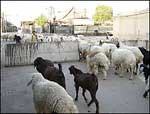Washington Post:
“The militiamen, when they saw the American army, they fled at extraordinary speed,” said Abdul Sattar, who was too afraid to leave his house to go to work this day. “They jumped into houses. One woman saw one of them in her house and fainted.”
Abu Mohammed described jumping into houses as a tactical move that the Mahdi Army often uses because its members know U.S. troops rarely remain long inside a neighborhood. “We didn’t want to confront them,” he said.
When Abu Mohammed returned to his home, enraged, he fired at the houses of his Sunni neighbors, even though they were not Egheidat. A Sunni neighbor, on hearing the gunfire, came out clutching an AK-47 assault rifle.
“I shot at him,” said Abu Mohammed. “He bent down, and the bullet struck his mother in the arm. Then I walked out into the neighborhood and shouted: ‘Any Sunni I see in the street is my enemy. No Sunni will stay in Tobji. The Sunnis are infidels.’ " Egheidat tribal leaders denied any involvement in the attack on the checkpoint, blaming radical Sunni insurgents seeking to deepen the divisions in Tobji.
“We’ll pay 10 times the amount – not four times, as tradition dictates – if what they are saying is true,” Egheidi said, referring to blood money. The reconciliation meeting was postponed. That night and the following day, the streets lay silent.
Here.

